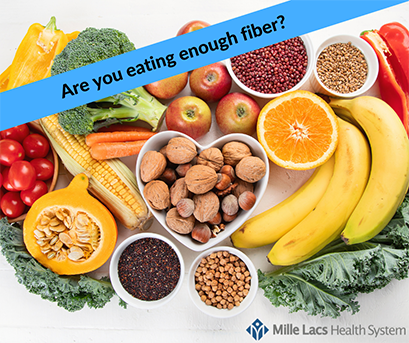Are you eating enough fiber?
March 3, 2023
Fiber is an important nutrient for good health. Our bodies can't use it for energy, but it has many benefits.
Fiber helps keep everything in the digestive system flowing, which helps avoid constipation and anything associated with it like hemorrhoids and diverticulitis. A healthy digestive system also ensures the body is properly absorbing vitamins, minerals, and other essential nutrients. Eating enough fiber may even lower your risk of certain types of cancer, such as colon cancer.
An additional benefit of fiber is the ability to help us feel full longer, which leads to healthy weight maintenance or loss. Fiber also assists in slowing down the breakdown of carbs into sugar which keeps blood sugar levels stable, avoiding diabetes. Fiber can also help lower cholesterol, in turn lowering your risk of heart disease.
Fiber, also known as roughage or bulk, is a type of carbohydrate that can't be broken down by the body's digestive enzymes. You can find fiber in plant-based foods such as: whole-grain breads, cereals, and pasta; beans, lentils, and peas; nuts and seeds; some fruits and vegetables; and even dark chocolate!
Fiber is commonly classified as soluble, which dissolves in water, or insoluble, which doesn't dissolve in water.
Soluble fiber (helps lower cholesterol and blood sugar) can be found in apples, bananas, citrus fruits, oats, carrots, peas, beans, brussel sprouts, avocados, potatoes, and more. Soluble fiber is a type of fiber that dissolves in water to form a gel-like substance in the stomach, slowing down the digestive process.
Insoluble fiber (helps regulate the digestive system) can be found in whole grains, leafy greens, cauliflower, green beans, nuts, seeds, and the skins of many fruits and vegetables. Helps with constipation – promotes the movement of material through the digestive system.
It's important to consume enough fiber each day to keep proper nutrition. The American Heart Association suggests total dietary fiber intake should be 25 to 30 grams a day from food, not supplements. The CDC estimates that most Americans only get about half the fiber they need each day.
